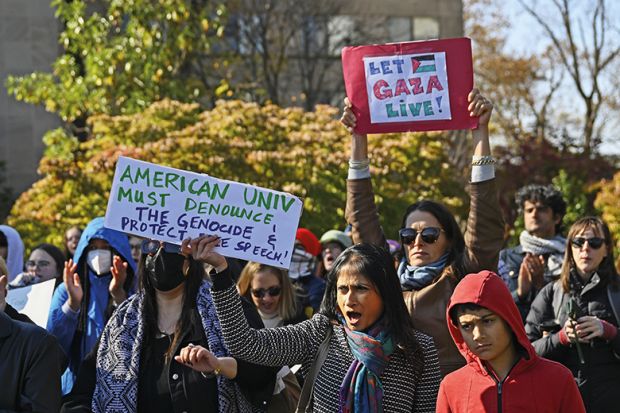The events in Israel and the Gaza Strip have riven the international community and many of our campuses. The atrocities committed by Hamas against innocent Israeli citizens have rightly been condemned. But deep concern has also been expressed for Palestinians regarding both the immediate consequences of the bombing and incursions and their longer-term struggles as a stateless people. The right of Israel to defend itself sits alongside the moral and legal requirements to protect non-combatants and innocent civilians. It is an agonisingly difficult set of issues.
Across the world, students, faculty and graduates disagree profoundly about the appropriate responses not only from the international community but also their own universities. Students have protested in support of both Palestinians and Israel. Donors and alumni have demanded that university leaders make clear their abhorrence of violence and the need to protect the well-being of their students.
It hasn’t been easy. Harvard University president Claudine Gay, for example, has issued different statements in response to waves of criticism about the stance of Harvard towards the conflict. Students who signed letters criticising Israel have been subject to doxxing and even threatened with having job offers rescinded. Donors have pulled funds and criticised universities for a lack of leadership in their response to the crisis.
Demands for institutional condemnation of atrocities and war crimes sit uneasily alongside equally strong demands that universities remain bastions of free speech. So how should universities distinguish between when it is appropriate (even necessary) to take a stand on a public issue and when not?
The choices are difficult – and institutions are likely to brook much criticism whatever they do. The recent global Edelman Trust Barometer makes clear that distrust of institutions, including universities, is now the default emotion for large segments of the world’s population. It is both the cause and the consequence of increasing polarisation in many societies.
At Times Higher Education’s World Academic Summit at the University of Sydney last month, more than 40 university presidents, from five continents, met privately to explore the challenges of leadership in this era of distrust. The event, initiated by Sydney vice-chancellor Mark Scott and facilitated by myself, was also timely given the institutional support given by some Australian universities for a “Yes” vote in the highly contentious referendum to amend the constitution to provide an Aboriginal and Torres Strait Islander “Voice to Parliament” (a proposal that was ultimately defeated).
One powerful model sees the university as a host of robust conversations on the great issues of the day, but never an active participant in them; the “Chicago Principles” on freedom of expression are one version of this ideal. However, in our meeting, many presidents noted that the truth-seeking mission of the university requires freedom of speech to be reconciled with a principle of inclusion and respectful dialogue.
After all, can we really invoke freedom, respect and equal opportunity as universities’ core values without ever taking a stance on issues or events that directly challenge them? Should we stay neutral when war crimes are committed? Should we play host to climate change deniers? Stay agnostic about the ongoing legacies of slavery, racism and colonial dispossession?
What was striking during our discussion was how deeply this group of presidents had already been thinking about these issues – no doubt because many had already been at the centre of searing controversies themselves. Participants reflected on how, whether they like it or not, university presidents are seen to embody their institution and its values in various ways. With that comes the responsibility to live up to those values in both words and deeds.
Unsurprisingly, our meeting heard a range of views expressed about the appropriate trade-offs. But we did identity some broad principles. First is the idea of “contested civility”. As a core value of the university, freedom of speech must be protected even when that makes life uncomfortable for the broader community. But respectful dialogue isn’t just about being polite. We can’t pursue our truth-seeking institutional missions without ensuring that we have the broadest participation possible from our students and faculty.
The reason is that we have something to learn from everyone’s perspective. In that sense, diversity is not an unfortunate factor that we have to dance around at times of conflict: it is critical for universities’ educational and intellectual missions. We need not only to actively recruit faculty, staff and students from a wide range of economic and cultural backgrounds but to embrace a diversity of approaches and methodologies within and across disciplines.
More broadly, universities should model the kinds of conversations the broader community needs to have about difficult issues. As one president put it, we should appeal to the higher purpose of our institutions to distinguish our approach to these questions from that of other organisations in the public sphere. Our role is not to provide a platform for anything goes, akin to the wilder reaches of the internet, but to provide substantive, rigorous, evidence-based knowledge and understanding. And we should never shy away from saying, “It’s more complicated than that.”
None of this guarantees a quiet life for a university president. That isn’t why they signed up for the job. But our conversation ended with a sense that staying true to the fundamental purpose of universities is, among many difficult choices, the best strategy.
Duncan Ivison is professor of political philosophy at the University of Sydney. He was deputy vice-chancellor (research) from 2015 to 2022.
Register to continue
Why register?
- Registration is free and only takes a moment
- Once registered, you can read 3 articles a month
- Sign up for our newsletter
Subscribe
Or subscribe for unlimited access to:
- Unlimited access to news, views, insights & reviews
- Digital editions
- Digital access to THE’s university and college rankings analysis
Already registered or a current subscriber? Login






